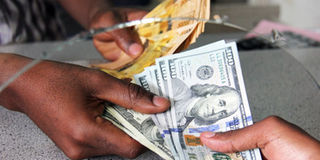Budget advocacy firm asks investors to pay in dollars

The heightened government borrowing from commercial banks is suffocating private access to credit. FILE PHOTO
Kampala. The impact of the exchange rate volatility that saw the Shilling weaken against the dollar to an all-time low for the first time in over a decade, could be lessened with strict regulation of forex bureaus and restrictive policies on payments in dollars.
According to the Civil Society Budget Advocacy Group (CBAG), whose agenda is lobbying for proper and equitable deployment of resources, unless government reigns in on widespread dollar transactions in the market while limiting the outflow of dollars; the pressure on the Shilling will continue to build.
Between 2011 and 2014, the Uganda shilling depreciated by about Shs 500 against the dollar; that was a gradual drop which caused no ripples. But when the dollar exchange rate broke the psychological barrier of Shs 3,000 in the second week of March 2015, it created a fearful mood in the economy.
Owing to those developments in the exchange rate market, CSBAG leadership says this is bound to affect next financial year’s (2015/16) Budget.
“The act of charging for services provided in Uganda in dollars is worsening the already bad forex situation. For as long as the investors, local or international do not value the Shilling enough to have it as the medium of exchange in our economy, the forex situation will continue to be bad,” the Civil Society Budget Advocacy Group (CSBAG) coordinator, Mr Julius Mukunda, said last week.
He continued: “This is common in the tourism and services sector to the extent that even local building owners in Uganda ask for rent in dollars, let alone those offering local consultancies.”
Speaking at the same news conference last week, CSBAG Budget policy specialists, Mr David Walakira, said the payment in dollars partly explains why some rentals especially in Kampala and consultancies services are expensive for nothing.
It also emerged that the dollar volatility is being worsened by poor regulation and policies which are incapable of controlling outflow and inflow of forex.
According to Mr Mukunda, Uganda is one of the few countries in the world that has no limit on the amount of forex that can be repatriated, exchanged or held as cash at any one time, thanks to the government policy of liberalisation.
By press time the Central Bank—the industry regulator, had not responded despite being contacted.
how the shilling has depreciated
From January 2, 2015 to March 2, 2015 the Shilling sharply depreciated against the dollar, from Shs2,7841 to Shs2,896, before slightly surpassing the Shs3,000 mark. The decline started in February, 2014 when President Museveni signed the Anti-Gays Bill into law.




